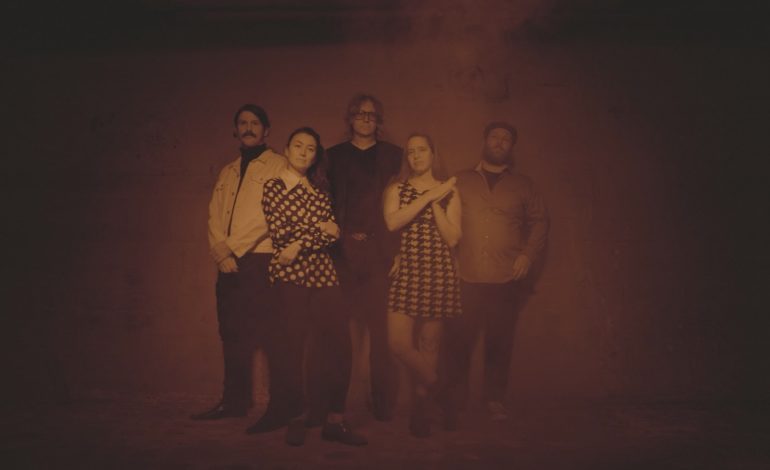

The Besnard Lakes have carved a cozy place in which sad thunder resonates with hope, dread and the sonorous hiss of radio waves lapping onto alien shores. This past Saturday, the five-piece, later joined by a three-piece brass section, streamed a surge of sonic swells from their home turf on Montreal’s La Sala Rossa tight stage. They came armed with a half dozen synthesizers and a selection of stratospheric rocket rides spanning much of their two-decade catalog, including five from this year’s aptly titled Are the Last of the Great Thunderstorm Warnings.
The opening song, “46 Satires,” from 2013’s Until in Excess, Imperceptible UFO, set the tone and embodied TBL’s sound. Stony vocals and persistently chill triads on Olga Goreas’s bass, paired with tubular synth tones that could easily be mistaken for Beach House or some other second wave shoegaze band, disarmed the ear with easy harmonies and comforting echo on the guitars. But this druggy, glass-eyed sheen of dream and generosity cracked open midway through the song, when blinding white strobe lights and a low dissonance underscoring a rejoicing vocal chorus happily announced the arrival of the four horsemen, before abruptly pulling back for one last quiet verse.
This glacial take on the loud-quiet-loud song structure (or more appropriately, quiet-loud-quiet) comes from a great tradition of Canadian indie rock of which The Besnard Lakes sit in good company. But the deceptively simple, repetitive structures that make an epic GY!BE composition are hard to find in TBL’s keep-em-guessing chord progressions that, even without vocals, are narratively oriented, more like water channeled over a chaotic landscape than a series of distinct buckets into which lyrics are dumped. There were many times in the set when rich unchanging harmonies were recontextualized and reimagined over the steadily shifting arrangement beneath them. But patient movements paid out dividends over time. It often felt like a fugue relationship between instruments and vocals that were trying to reach an accord, taking an admirable and leisurely amount of time to do so. In “Blackstrap,” for instance, a steadily ascending series of bass arpeggios thumped beneath an endless supply of highs before a stadium-filling guitar solo busted through, echoey as hell and befitting of any Wagnerian Canadian band worth its salt.
There is no doubt that The Besnard Lakes’ artistic raison d’etre is the aspiration of beauty, which, as lush, varied and ambitious the compositions are, can often slide into monotony. It may have been by design that the noisiest moments by far came halfway through the set when they played “Thomasina” from their very first album, 2003’s Volume I. If “46 Satires” was their Beach House moment, this was their Sonic Youth moment, where music and sound met in the middle and duked it out in order to distinguish themselves from each other, only to conclude that they are, or can be, the same thing. But even after the quirky jangle and clash that opened the song and then returned in modified bursts, they always found their way back home to the sprawling resonances that define them.
The set closed out with three songs in which they were joined by a tenor sax, trumpet and trombone, starting on 2010’s “Chicago Train,” which telegraphed the bluesy hustle of Chicago rhythm and blues. A wide panoply of reference makes The Besnard Lakes’ sound as distinct as it is universal. The latter-day references already mentioned blended seamlessly with the big rock sounds that once echoed over the hills above Laurel Canyon in the early 1970s, and in a quick turn, could become timeless, haunting meditations that would be at home on the stage of the Roadhouse in Twin Peaks: The Return. Epic in scope but tender in heart, the set could have been a perfect soundtrack for an end or a beginning, but if time could be objectified, The Besnard Lakes may provide the perfect score for time itself.
Set List:
